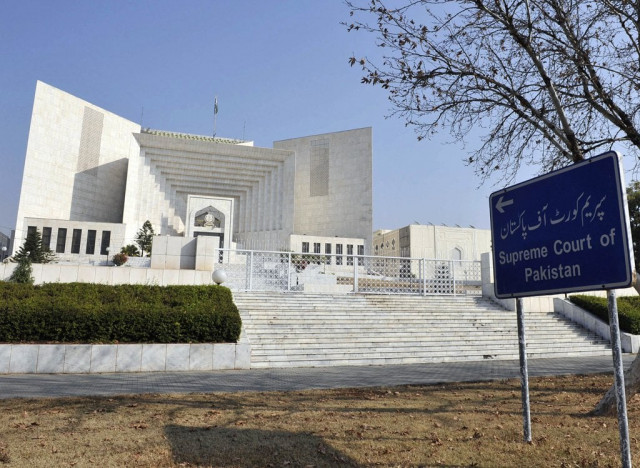New SJC composition to be significant in Isa case
It is to be seen whether Justice Bandial would still be part of 10-judge bench

The Supreme Court of Pakistan. PHOTO: AFP
The SJC has been recomposed after Dec 20 retirement of the former chief Justice of Pakistan (CJ) Asif Saeed Khan Khosa. Now the new CJ Gulzar Ahmed has assumed the position of SJC chairman and the Supreme Court’s Justice Umar Ata Bandail has been inducted in view of his seniority.
The SJC consists of three senior most Supreme Court judges including the CJ and two senior most chief justices of the provincial high courts.
Interestingly, Justice Umar Bandial is also head of the 10 judge full-court that is hearing a slew of petitions against a presidential reference that was filed last year to seek removal of Justice Isa, who is accused of not disclosure of his family assets in his wealth statement.
The full court has so far conducted 21 hearings in this case and Justice Isa’s counsels – Muneer A Malik and Babar Sattar – have already concluded their arguments. Next hearing of case is yet to be scheduled. However it is expected that case will be listed after January 15.
Now the there is an ongoing discussion as to whether or not Justice Bandial will sit in the full-court or will recuse himself from hearing the case.
Legal experts believe that Justice Bandial’s recusal will be very significant as the full-court members have already divergent view on the legal points raised by petitioner judge.
Justice Bandial is among those judges who during the hearing of case have raised questions about maintainability of the petitions in view of Articles 211 and 248.
A senior lawyer, who is appearing before the full-court, believes that it is the judge’s discretion to sit in the bench or recuse himself after becoming the SJC member.
Former attorney general Waqar Rana said the SC judge should opt his recusal in order to avoid possibility of anomaly, adding that the SJC is also constitution body.
“If Justice Bandial continues to preside the bench and later the full court rejects the SC judge’s petition then who will be third SJC member from the Supreme Court [as after such order Justice Bandial would not be able to sit in the SJC]” he said.
Ten SC judges are already hearing Justice Isa’s petition while two judges – Justice Sardar Tariq Masood and Justice Ijazul Ahsan – have already recused himself from the hearing in view of the objections raised by the petitioner judge.
Recently elevated Justice Aminuddin Khan is the only judge, who will eligible to sit in the SJC, in case the SC rejects the petitions against the presidential reference
On the other hand, if Justice Bandial recuses then Justice Maqbool Baqar will likely to preside the nine members’ bench. However, in discussion with senior government officials it transpired that the government does not want Justice Bandial’s recusal from the full-court.
On the other hand, representatives of superior bars want that Justice Bandial recuse himself from hearing the case. But they agree that no one can compel him to do this.
Justice Isa has already accused the SJC led by ex-CJP Asif Saeed Khosa of biasness. However, both Justice Khosa and SJC secretary Arbab Arif have already retired.
The government functionaries, who were very active for the SC judge’s removal, have been engaged in some other critical issues. The Presidential reference was filed against Justice Isa in May 2019.
Two SJC members Justice Khosa and Justice Sheikh Azmat Saeed have already retired. Superior bar members are confident that majority judges will quash the presidential reference
A senior PTI leader believes that that was not a wise decision to file the presidential reference. “We should learn lesson from history. Whenever the executive moves the SJC for ousting a judge, the majority of judges get united. We also witnessed this in former CJ Iftikhar Chuadhary case,” he added.



















COMMENTS
Comments are moderated and generally will be posted if they are on-topic and not abusive.
For more information, please see our Comments FAQ